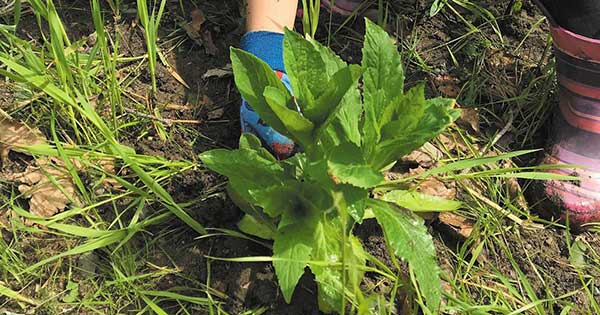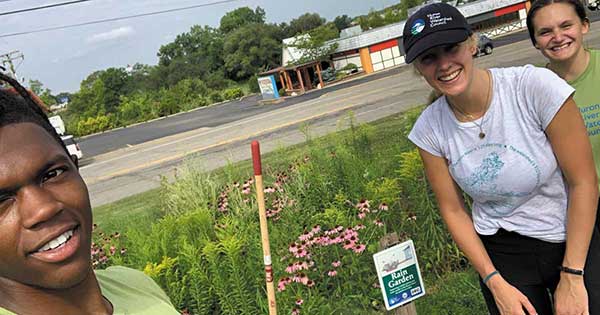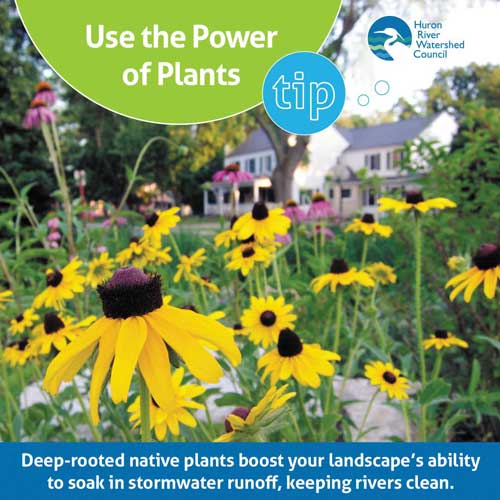HRWC partners develop new program
 HRWC recently jumped into rain garden development in a big way. While HRWC has promoted the benefits of rain gardens for years, until 2022 we relied on other partners to lead the charge. Now we are working collaboratively with partners on several initiatives to expand rain gardens across the watershed and Southeast Michigan. This is an exciting step for our organization; while each individual garden is small, collectively rain gardens can have a positive impact on the quality of the Huron River.
HRWC recently jumped into rain garden development in a big way. While HRWC has promoted the benefits of rain gardens for years, until 2022 we relied on other partners to lead the charge. Now we are working collaboratively with partners on several initiatives to expand rain gardens across the watershed and Southeast Michigan. This is an exciting step for our organization; while each individual garden is small, collectively rain gardens can have a positive impact on the quality of the Huron River.
A successful history
In 2005, HRWC partnered with the Washtenaw County Water Resources Commissioner’s Office to create the first regional program to help residents in the county build rain gardens. Since then, more than 1,000 rain gardens have been installed. These gardens capture and treat an impressive 90-95% of the roof and driveway runoff from rainstorms. Only the most intense storms will overflow these gardens to the stormwater system. The Friends of the Rouge saw this success and developed their own rain garden program, called RainSmart. They have a goal of building 1,000 rain gardens in the Rouge River watershed. Additional partners in the Clinton River and Detroit River watersheds are joining HRWC to expand the number of rain gardens throughout Southeast Michigan.
A new collaboration
 As HRWC worked with various partners to install rain gardens and other Green Stormwater Infrastructure (GSI), other watershed groups in Southeast Michigan were working on similar efforts. A rain garden partnership was organically growing among Washtenaw County, HRWC, and the Friends of the Rouge. This partnership grew as staff from other Southeast Michigan organizations discussed a shared desire to increase residential rain gardens in their communities. This meeting-of-the-minds resulted in an expansion of the Washtenaw County Master Rain Gardener course beyond the county’s border, to be offered online to anyone in Southeast Michigan. Staff from partner organizations helped teach the course and host breakout sessions for residents in their watersheds for one-on-one feedback and support. HRWC staff did onsite assessments and even provided tools and plants to students in our watershed! The live, online course is offered again this year (2023), with in-person tours of rain gardens throughout the region.
As HRWC worked with various partners to install rain gardens and other Green Stormwater Infrastructure (GSI), other watershed groups in Southeast Michigan were working on similar efforts. A rain garden partnership was organically growing among Washtenaw County, HRWC, and the Friends of the Rouge. This partnership grew as staff from other Southeast Michigan organizations discussed a shared desire to increase residential rain gardens in their communities. This meeting-of-the-minds resulted in an expansion of the Washtenaw County Master Rain Gardener course beyond the county’s border, to be offered online to anyone in Southeast Michigan. Staff from partner organizations helped teach the course and host breakout sessions for residents in their watersheds for one-on-one feedback and support. HRWC staff did onsite assessments and even provided tools and plants to students in our watershed! The live, online course is offered again this year (2023), with in-person tours of rain gardens throughout the region.
In addition to teaching students how to install their own rain gardens, these courses have helped HRWC and partner agencies learn how to best support community members interested in GSI. It is important to be responsive to students and gardeners in areas they identify as most in need of guidance, such as learning basic information about rain gardens, choosing the best site for a garden on their property, garden design, or finding native plants for sale. The popularity of the rain garden class is encouraging for the Friends of the Rouge, HRWC, Clinton River Watershed Council, Friends of the Detroit River, and the Alliance of Downriver Watersheds as we explore ways to share resources and efforts for growing other GSI strategies throughout Southeast Michigan. These watershed groups recently formed an informal collaboration to deliver GSI assessment, design, installation, and maintenance services. The partners compiled a market analysis to evaluate GSI product and service needs and are developing a business plan to sustainably fund the collaboration, which will be implemented over the next few years.
Michigan provides funds to help
 At the end of 2022, HRWC was awarded a grant from the State of Michigan’s Nonpoint Source Program to further grow the residential rain garden program beyond Washtenaw County. A priority is working with Washtenaw County staff to build off their highly successful program, focusing on two communities to start. Residents in the cities of Brighton, in Livingston County, and Belleville, in Wayne County, will soon be receiving information about new programming to help them design and install rain gardens on their property. HRWC will be hosting workshops in those communities starting this summer to share the word about rain gardens and encourage participation in local, in-person training courses. HRWC will also provide site assessments, design advice, and installation assistance along the way to ensure that novice rain gardeners in these areas get the support they need to build a rain garden.
At the end of 2022, HRWC was awarded a grant from the State of Michigan’s Nonpoint Source Program to further grow the residential rain garden program beyond Washtenaw County. A priority is working with Washtenaw County staff to build off their highly successful program, focusing on two communities to start. Residents in the cities of Brighton, in Livingston County, and Belleville, in Wayne County, will soon be receiving information about new programming to help them design and install rain gardens on their property. HRWC will be hosting workshops in those communities starting this summer to share the word about rain gardens and encourage participation in local, in-person training courses. HRWC will also provide site assessments, design advice, and installation assistance along the way to ensure that novice rain gardeners in these areas get the support they need to build a rain garden.
Planting for deep-rooted partnerships
The biggest threat to the Huron River comes from stormwater runoff. As more land is developed, increasing amounts of runoff from pavement and roofs flow directly into our creeks and waterways. This increased flow carries pollutants and sediments, which damages streambanks and aquatic habitat. The same holds true for other watersheds in the region. Because the solutions to these stormwater runoff issues are the same, it makes sense for watershed groups to work together. By sharing knowledge, resources, and efforts, communities can build GSI more efficiently while learning and working together.
The shared goals for green infrastructure unite us and we look forward to working together to protect our waterways. Stay tuned as our partnership grows.
—Ric Lawson and Anita Daley

This blog post is also published in the Huron River Report, Spring 2023.



